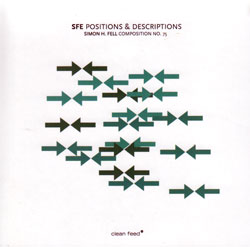
Simon Fell's large ensemble music has always been...gnarly. He tosses in references from across a wide range of the musical spectrum: some Boulezian serialism here, some Braxton there, here a little bit o' Zappa, there some Webern. Often this is all underlain by a relatively traditional sounding free jazz rhythm section (here, himself on bass and the redoubtable Mark Sanders on drums). The results can be occasionally exciting, even gripping, but more often unwieldy, clunky even, lurching along in some netherworld between idioms yet not forming a convincing alternative itself.
On this recording, notables among the 15 or so assembled include Tim Berne, Jim Denley, Rhodri Davies, Steve Beresford and Joe Morris and they set to grappling with the 71-page score, taking up the full allotted 80 minutes of disc space. The complexity of the piece is clear; no one would doubt that. The ensemble is sectioned off into various sub-groupings, playing off one another. Often one section will be improvising, another following set directions. Fell obviously has an ear for timbre and, sometimes, the sheer gorgeousness of sound is winning on its own. But there's also, generally, a pinched quality to the arrangements, something one often hears in the large band arrangements of Braxton or Sam Rivers that, intentional though it may be, contrasts unfavorably with both the more purely jazz-inspired soloing (yes, there are solos, like one by Berne on the first track, that sound as though they could have appeared on any garden variety NYC contemporary jazz album) as well as that playing which is more akin to the kind found in modern electro-acoustic improvisation. Fell will shift abruptly from one "style" to another, in a collage like manner that was startling enough 25 years ago but seems stale today.
Some of those sequences are quite attractive on their own, such as a flute/theremin duo in the first piece and track 4, "FZ pour PB" (see above), a delicate dance for quiet violin, percussion and assorted unidentifiable sounds. That section leads into a Mingusian vamp but � and here's the rub � entirely lacking in the requisite musicality of his reference. Instead of soulful and liquid, we get stilted and shrill. Again, I have little doubt that the effect is precisely what Fell intended but I have to question its ultimate value; the halfway aspect is unsettling and not in a good way; when Chris Batchelor begins soloing on trumpet, in a very standard fashion, it simply sounds misplaced, more so when the more atonal strings began to "comp" beneath, reminding one unpleasantly of many an ill-fated jazz with strings attempt. And then there's a tango. There are some musicians of whom one doesn't want to be reminded if the music isn't up to their standards; Mingus and Piazzolla are two.
So it goes, veering between lovely patches (part seven once more feature Denley's fine flute as well as nice bass clarinet from Andrew Sperling) and more strident bluster, between some fine guitar work from Morris to sludgy strutting sounding like WSQ on an off day. A frustrating recording.
Comments and Feedback:



More Recent Reviews, Articles, and Interviews @ The Squid's Ear...


|

